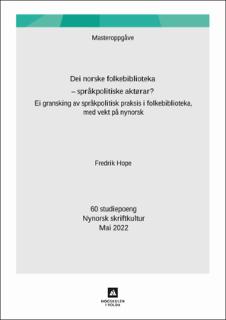Dei norske folkebiblioteka – språkpolitiske aktørar? Ei gransking av språkpolitisk praksis i folkebiblioteka, med vekt på nynorsk
Master thesis
Permanent lenke
https://hdl.handle.net/11250/3012501Utgivelsesdato
2022Metadata
Vis full innførselSamlinger
- Nynorsk skriftkultur [25]
Sammendrag
Folkebiblioteka er mellom kulturinstitusjonane i Noreg som har flest brukarar, og arbeidet deira har ein vesentleg språkpolitisk dimensjon. Denne oppgåva undersøkjer dei norske folkebiblioteka som språkpolitiske aktørar, med vekt på språkpolitikken kring nynorsk.
Problemstillinga er:
I kva grad opererer dei norske folkebiblioteka som språkpolitiske aktørar for å fremjaeller ikkje fremja nynorsk, kva tiltak tek dei i bruk, og kva styrer vala deira?Eg svarar på problemstillinga gjennom fire forskingsspørsmål:
• Kva språkpolitiske føringar legg sentrale og eit utval regionale og lokalestyresmakter på folkebiblioteka?
• I kva grad ser folkebiblioteka på seg sjølve som språkpolitiske aktørar for å fremja eller ikkje fremja nynorsk?
• Kva språkpolitiske val og tiltak for å fremja eller ikkje fremja nynorsk finn me i norske folkebibliotek?
• Kva motiverer desse vala i norske folkebibliotek?
Metodane er ei kvantitativ spørjeundersøking som 187 folkebibliotek svara på, og ein retorisk argumentasjonsanalyse av åtte bibliotek-, kultur- og språkpolitiske dokument. For å gjera utvalet har eg gått gjennom 129 dokument frå kommunar, fylkeskommunar og statlege styresmakter og sett på i kva grad dei tematiserer språkpolitikk, nynorsk og folkebibliotek i samanheng.
Resultata tyder på at folkebiblioteka i relativt stor grad har ein språkpolitisk aktørskap, og atdei heller er normsetjarar som opprettar språkpolitikk, enn aktørar som tolkar og approprierer språkpolitikk utforma av andre.
Dokumenta eg har granska, har mange overordna føringar om språkpolitikk og nynorsk, men sjeldan konkrete mål og tiltak for nynorsk i folkebiblioteka. Mange folkebibliotek svarar at dei gjer tiltak for å fremja nynorsk. Døme på tiltak som kan karakteriserast som språkpolitiske dult, er vektlegging av nynorsk i litteraturformidlinga tilunge, samarbeid med nynorskinstitusjonar om arrangement, nynorskprosjekt som nynorske utebibliotek og å oppmoda skeptiske lånarar til å lesa nynorskbøker. Merking avnynorskbøker og eigne nynorskhyller er utbreidde tiltak som har potensial for å veranynorskfremjande, men dei er omstridde.
Den lokale språkstoda har stor innverknad på i kva grad folkebiblioteka svarar at dei prioriterer og fremjar nynorsk. Folkebiblioteka meiner at gulrøter som tilskotsordningar ogmeir tilgjengeleg materiell på nynorsk kan bidra til høgare prioritering av nynorskfremjandetiltak. Andre funn tyder på at folkebiblioteka vert påverka av politiske dokument somtematiserer nynorsk og folkebibliotek i samanheng, til dømes kommunale språkplanar. Men mykje tyder på at dagens språkpolitikk for nynorsk i folkebiblioteka kjem nedanfrå og opp, ogikkje ovanfrå og ned Abstract
The public libraries are among the cultural institutions with the most users in Norway. Consequently, the language policy dimension of the libraries is substantial. This thesis examines Norwegian public libraries as language policy agents, with an emphasis on language policies tied to Norwegian nynorsk.
The thesis questions are:
To what extent do Norwegian public libraries act as language policy agents to strengthen or limit Nynorsk, how is this done, and what informs their language policy decisions?
I address these thesis questions by analyzing four research questions:
• What language policy guidelines are implemented on the public libraries by centralized and a selection of regional and local governments?
• To what extent do public libraries consider themselves agents to strengthen or limit Nynorsk?
• What language policy decisions and measures are made in Norwegian public libraries to strengthen or limit Nynorsk?
• What are the motivations behind these decisions and measures?
A combination of quantitative and qualitative methods are used to answer these research questions: 187 public libraries replied to a quantitative survey, and I have qualitatively analyzed a selection of eight official documents. This selection was made by sifting through 129 documents from municipalities, counties and federal governments to locate where they address the connection between language policies, Nynorsk and public libraries.
The results suggest that public libraries have a relatively high degree of language policy agency. Rather than interpreting and appropriating policies as indicated by other institutions and governments, public libraries are arbiters that develop their own language policies.
The official documents provide language policy guidelines, but they rarely offer concrete objectives and procedures about Nynorsk in public libraries. Many public libraries claim they work to strengthen Nynorsk by measures that are forms of language policy nudging. These include emphasizing Nynorsk when promoting literature to children and young people, collaborating with institutions that work specifically with Nynorsk, outdoor libraries with books in Nynorsk, and encouraging reluctant users to choose books in Nynorsk. Labeling books and making separate sections for books in Nynorsk can potentially strengthen Nynorsk, though these measures are debated.
The local language context is a major factor that influences the language policies of public libraries. The libraries believe economical support and better access to material in Nynorsk are important to enable them to work to strengthen Nynorsk. Political documents that focus on the connection between Nynorsk and public libraries, as well as municipal language plans, also inform the language policy decisions in public libraries. Nonetheless, my findings suggest that the Nynorsk language policies in Norwegian public libraries are mainly initiated from the bottom up.
